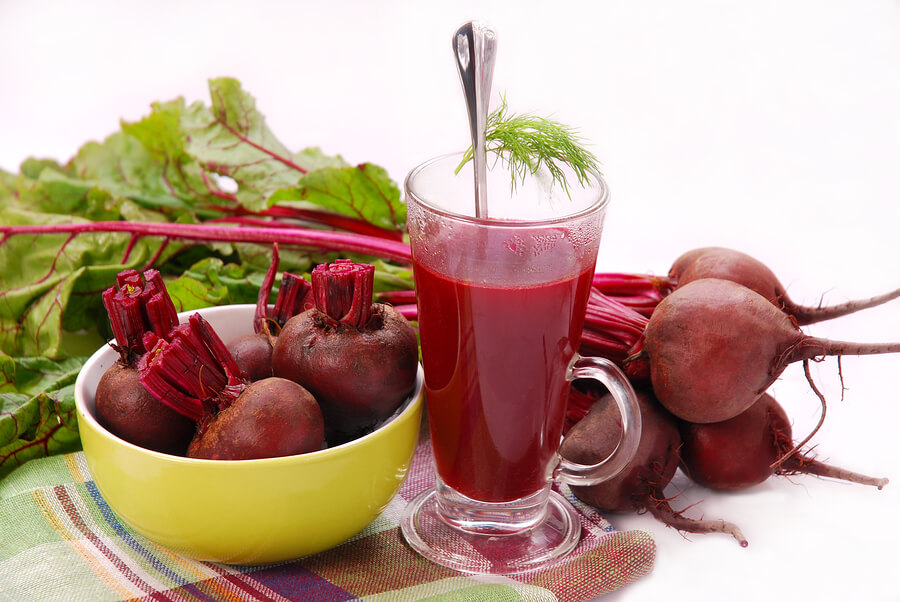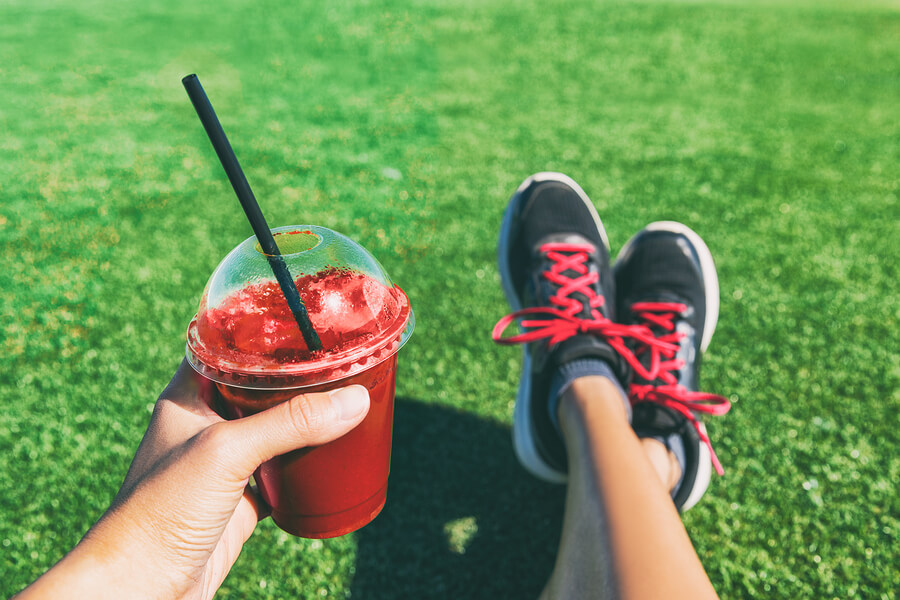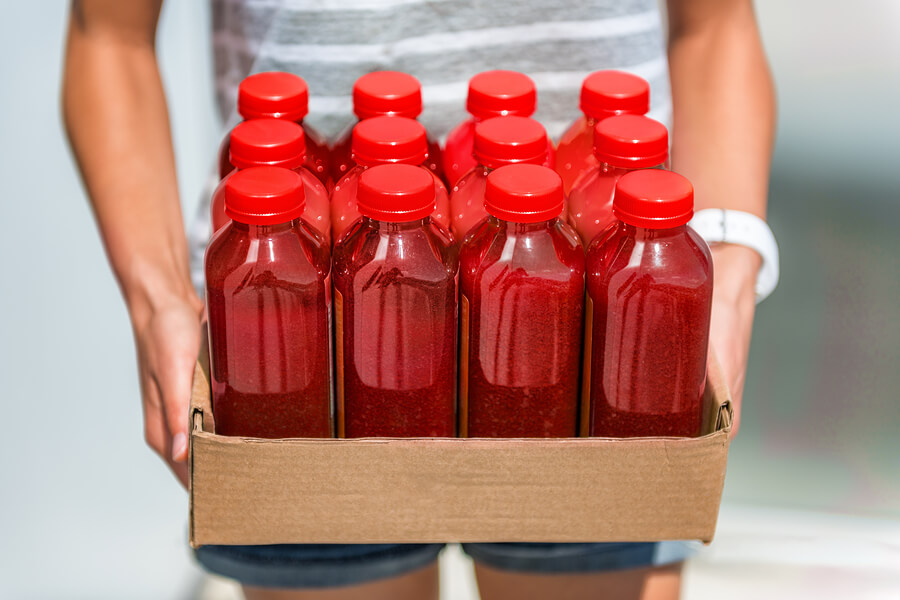Table of Contents
How Drinking Beet Juice Can Help You Stick to a Daily Exercise Routine
Are you seeking a natural, nutritious, and effective way to improve your workout routine? Well, look no further. The key to amplifying your daily exercise regimen may be hiding in your kitchen's produce section. Enter beetroot juice. This vibrant, earthy beverage has been the subject of numerous scientific studies due to its astounding health benefits and potential to enhance athletic performance.
The Power of Beets: A Nutritional Overview
Beetroot, often referred to as just ‘beets', is a root vegetable with a rich, purple hue. Not only are they appealing to the eye, but beets also pack an impressive nutritional punch. They are low in calories and high in essential nutrients like folate, manganese, potassium, iron, and vitamin C.
However, the real game-changer for fitness enthusiasts is the high concentration of dietary nitrates found in beets. Dietary nitrates are compounds that your body can convert into nitric oxide, a molecule that improves blood flow, lowers blood pressure, and promotes cellular function. These processes are critical during exercise, making beetroot a superfood for those seeking an extra boost in their workout regimen.

The Science: How Beet Juice Affects Exercise Performance
Recent years have seen a surge of scientific interest in the potent effects of beetroot juice on exercise performance. The primary active component, dietary nitrates, are metabolized into nitric oxide within the body, leading to a cascade of benefits on physical performance. Here, we delve into these effects in detail.
Enhancement of Stamina
One of the standout benefits of beetroot juice is its notable effect on stamina and endurance. Scientific research reveals that beetroot juice can lead to a substantial increase in exercise duration. One study found that individuals who consumed beetroot juice were able to extend their exercise duration by up to 16%. This suggests that beetroot juice, rich in dietary nitrates, can potentially help you push past your limits during strenuous workouts by decreasing fatigue and bolstering your overall exercise tolerance.
Amplification of Muscle Power
The benefits of beetroot juice are not confined to endurance athletes alone. Remarkably, it has also been shown to enhance muscle power, even in individuals with heart failure. While more research is needed to fully understand this effect, preliminary evidence suggests that beetroot juice could potentially enhance the strength and power of your muscles during short, intense exercise bouts.
Promotion of Enhanced Blood Flow
Nitric oxide, a product of dietary nitrate metabolism within the body, is known for its vasodilatory effect – it widens blood vessels, thereby enhancing blood flow. This heightened blood flow facilitated by beetroot juice consumption allows for a greater amount of oxygen to be delivered to your muscles during exercise. This oxygen is critical for energy production in your muscles, and by ensuring its efficient delivery, you could potentially improve your overall workout effectiveness.
Reduction of Oxygen Cost during Exercise
Beetroot juice's effects extend even to the efficiency of oxygen usage during exercise. Multiple studies have highlighted beetroot juice's capacity to reduce the oxygen cost of exercise, which essentially means that your muscles require less oxygen to produce the necessary energy for physical activity. This improvement in oxygen efficiency can extend your time until fatigue, allowing for longer and potentially more effective workouts.

Making Beet Juice Part of Your Exercise Routine
Harnessing the power of beet juice for exercise enhancement involves more than just adding it to your shopping list. It requires knowing when to drink it, how much to consume, and how to incorporate it creatively into your diet.
Timing Your Consumption
The time at which you consume beet juice plays a critical role in reaping its benefits. Studies suggest that dietary nitrates peak in the bloodstream approximately 2-3 hours post-consumption. Therefore, drinking beet juice about 2 to 3 hours before you exercise can optimize its effects, providing a substantial boost during your workout.
Determining the Ideal Quantity
There isn't a ‘one-size-fits-all' approach to beet juice consumption. While doses used in research often range from 140 to 400 milliliters, individual responses may vary significantly. Hence, it's advisable to start with a smaller amount, assess how your body responds, and gradually increase it if you're comfortable and not experiencing any adverse effects.
Creative Incorporation into Your Diet
Drinking beet juice doesn't have to be a monotonous affair. You can experiment with various beet juice recipes to keep things interesting. Try combining it with other nutritious fruits and vegetables, like apples, carrots, ginger, and leafy greens.
Building a Pre-Workout Ritual
Establishing a pre-workout ritual that includes drinking beet juice can create a positive association and make your exercise routine feel more enjoyable and fulfilling. This ritual could also incorporate other preparatory activities like stretching, meditating, or setting your workout goals for the day.
Post-Workout Recovery
Don't limit beet juice to pre-workout consumption only. Its benefits for post-workout recovery, particularly its anti-inflammatory properties, make it a great choice for a post-exercise drink. Combining beet juice with a source of protein, like Greek yogurt or a scoop of protein powder, can make an excellent recovery shake.

Tips for Incorporating Beet Juice into Your Diet
Integrating beet juice into your daily meals doesn't need to be a tiresome or mundane task. Despite its earthy flavor, which may not be to everyone's liking when consumed alone, beet juice can be incorporated into various food items in exciting ways. Below are some creative ideas:
Smoothie Magic
Combine beet juice with fruits such as apples, pineapples, or oranges for a power-packed smoothie. The sweetness of these fruits can help mask the earthy flavor of beet juice, making it more enjoyable while providing a host of nutrients.
Yogurt Twist
Start your morning on a healthy note by adding a splash of beet juice to your yogurt. Not only will this give your breakfast a delightful color, but it will also enhance its nutritional profile.
Salad Dressing Extraordinaire
Diversify your homemade salad dressings by including beet juice. This addition can infuse your dressings with a unique flavor and a vibrant color, making your salads even more appetizing.
Healthful Ice Pops
For a refreshing and healthy treat during the summer months, consider making ice pops with beet juice and other fruit juices. This can be an appealing way for both kids and adults to benefit from beet juice.
Nutritious Soups
Beet juice can also be incorporated into soups. This not only adds nutritional value but also enhances the flavor and color, making your meal visually appealing and equally delicious.
Overcoming Exercise Challenges with Beet Juice
Maintaining a consistent exercise routine isn't always a walk in the park. Obstacles like fatigue, lack of motivation, and low energy levels can sometimes feel insurmountable. Here's where beet juice comes into play.
Conquering Fatigue
The nitric oxide produced from the dietary nitrates in beet juice doesn't just enhance blood flow; it also facilitates more efficient energy production, helping you to feel less fatigued during and after your workouts. Whether you're a morning exerciser struggling to shake off the remnants of sleep or an evening fitness enthusiast fighting the day's accumulated exhaustion, a glass of beet juice could give you the energy kick you need.
Motivation Booster
The psychological aspect of exercise is often overlooked. If you see and feel tangible improvements in your workout performance, it can significantly boost your motivation to stick to your routine. By enhancing endurance and muscle power, beet juice can provide that sense of progress and achievement, pushing you to stay consistent with your exercise regimen.
Fighting Off Post-Workout Soreness
There's a sweet satisfaction that comes with muscle soreness after a good workout – a tangible sign of your hard work. However, when it becomes too intense, it can hinder your subsequent workouts. Thanks to its anti-inflammatory properties, beet juice can help reduce this post-workout muscle soreness and accelerate recovery, ensuring you're ready and raring to go for your next session.
Beet Juice and Hydration
Hydration and physical performance are deeply intertwined. Ensuring adequate hydration is a cornerstone for effective workouts, positively impacting various aspects of your physical capabilities, ranging from strength and power to stamina and flexibility.
In this context, beet juice can be a powerful ally. Here's how:
- High Water Content: Beet juice is largely composed of water, around 87% to be precise. This high water content makes beet juice an excellent choice to help replenish your body's fluid levels during strenuous workouts. The natural sugars in beet juice also provide a quick energy boost.
- Creating a Natural Sports Drink: With some creativity, you can turn your beet juice into a hydrating sports drink. By adding electrolyte-rich ingredients like celery or a pinch of sea salt to your beet juice, you can enhance its rehydration capabilities. Electrolytes are essential for fluid balance and muscle function, making them vital during prolonged exercises.
- Post-Workout Rehydration: Beet juice can also play a critical role in post-workout recovery. The combination of its natural sugars, water content, and the possibility to add electrolytes can support faster recovery by replenishing the body's depleted resources.
A Word of Caution: Potential Side Effects and Interactions
While the health and exercise benefits of beet juice are impressive, it's important to keep in mind that individual responses can vary greatly. As with any modification to your diet, it's prudent to introduce beet juice slowly and keep a close watch on your body's reactions. Here are some potential considerations:
Beeturia
One of the harmless but surprising side effects of consuming beet juice is beeturia, a condition where your urine might turn red or pink. This is simply due to the natural pigments in beets and is no cause for alarm.
Digestive Changes
Some individuals may notice changes in their bowel movements after consuming beet juice, including alterations in stool color and consistency. Additionally, an upset stomach might occur, especially if you're not used to consuming beets or beet juice.
Kidney Stone Risk
For those predisposed to kidney stones, caution is advised. Beets contain a substantial amount of oxalates, which are compounds known to contribute to kidney stone formation. Therefore, if you have a history of kidney stones, it might be prudent to moderate your beet juice intake and discuss this dietary change with your healthcare provider.
Allergies
While rare, some people may be allergic to beets. Symptoms of a beet allergy can include hives, itching, or even anaphylaxis in severe cases. If you suspect a beet allergy, it's crucial to stop consuming beet juice and consult with a healthcare professional.
Conclusion
Including beet juice in your pre-workout regimen could be the missing link in your daily exercise routine. Providing improved stamina and faster muscle recovery, it not only enhances your workout performance but also makes it easier for you to stick to a consistent exercise schedule. As always, it's essential to listen to your body and consult with a healthcare professional if you have any health concerns. Cheers to a healthier, active life with beet juice!
Sources
- “The potential benefits of red beetroot supplementation in health and disease” – Nutrients Journal (https://www.ncbi.nlm.nih.gov/pmc/articles/PMC4425174/)
- “Effects of beetroot juice supplementation on intermittent high-intensity exercise efforts” – Journal of the International Society of Sports Nutrition (https://jissn.biomedcentral.com/articles/10.1186/s12970-017-0204-9)
- “Beetroot juice and exercise: pharmacodynamic and dose-response relationships” – Journal of Applied Physiology (https://journals.physiology.org/doi/full/10.1152/japplphysiol.00372.2013)




Comments
Loading…